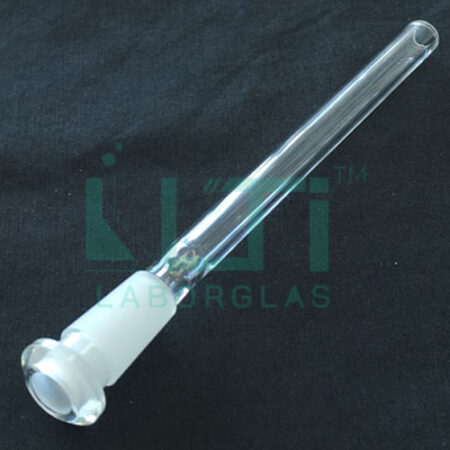Acc. to DIN 12249
| Part No. | CONE Size | Approx. O.D. Of Tube | Total length (mm) | Pack (qty.) |
| 1260-10C | 10/19 | 8 | 120±10 | 10 |
| 1260-12C | 12/21 | 9 | 120±10 | 10 |
| 1260-14C | 14/23 | 13 | 120±10 | 10 |
| 1260-19C | 19/26 | 16 | 125±10 | 10 |
| 1260-24C | 24/29 | 22 | 135±10 | 10 |
| 1260-29C | 29/32 | 26 | 135±10 | 10 |
| 1260-34C | 34/35 | 30 | 150±10 | 10 |
| 1260-40C | 40/38 | 36 | 150±10 | 10 |
| 1260-45C | 45/40 | 40 | 150±10 | 10 |
| 1260-50C | 50/42 | 45 | 150±10 | 10 |
Here are some common uses of single glass cone joints in a laboratory:
- Distillation Setups:
- Single glass cone joints are used in distillation setups, connecting the boiling flask, condenser, and receiving flask. This configuration allows for efficient separation of components based on their boiling points.
- Vacuum Filtration:
- In vacuum filtration systems, glass cone joints are used to connect the filtration flask to the filter assembly. This ensures an airtight seal, enabling the application of vacuum pressure to facilitate filtration.
- Reaction Vessels:
- Single glass cone joints are employed in assembling reaction vessels, enabling the connection of different components such as the reaction flask, condenser, and receiver.
- Rotary Evaporators:
- Rotary evaporators often utilize glass cone joints to connect the evaporating flask, condenser, and receiving flask. This setup allows for the removal of solvents under reduced pressure.
- Chromatography Columns:
- Glass cone joints are used in the assembly of chromatography columns, allowing for the connection of different column sections and ensuring a secure and leak-free system.
- Jointed Glassware for Educational Purposes:
- In educational laboratories, single glass cone joints are frequently used to teach students how to assemble different types of glassware for various experiments, helping them understand the principles of laboratory setups.
- Laboratory Glassware Assembly:
- Single glass cone joints play a crucial role in the assembly of custom laboratory glassware setups for specific experiments or processes. They allow for flexibility in designing experimental apparatus.
- Rotavap (Rotary Evaporation) Systems:
- Rotary evaporators commonly use glass cone joints to connect the rotating flask, condenser, and receiving flask. This configuration facilitates the evaporation of solvents under vacuum.
- Semi-Micro and Microscale Chemistry:
- Single glass cone joints are used in setups for semi-micro and microscale chemistry experiments, where smaller quantities of reagents are involved.




